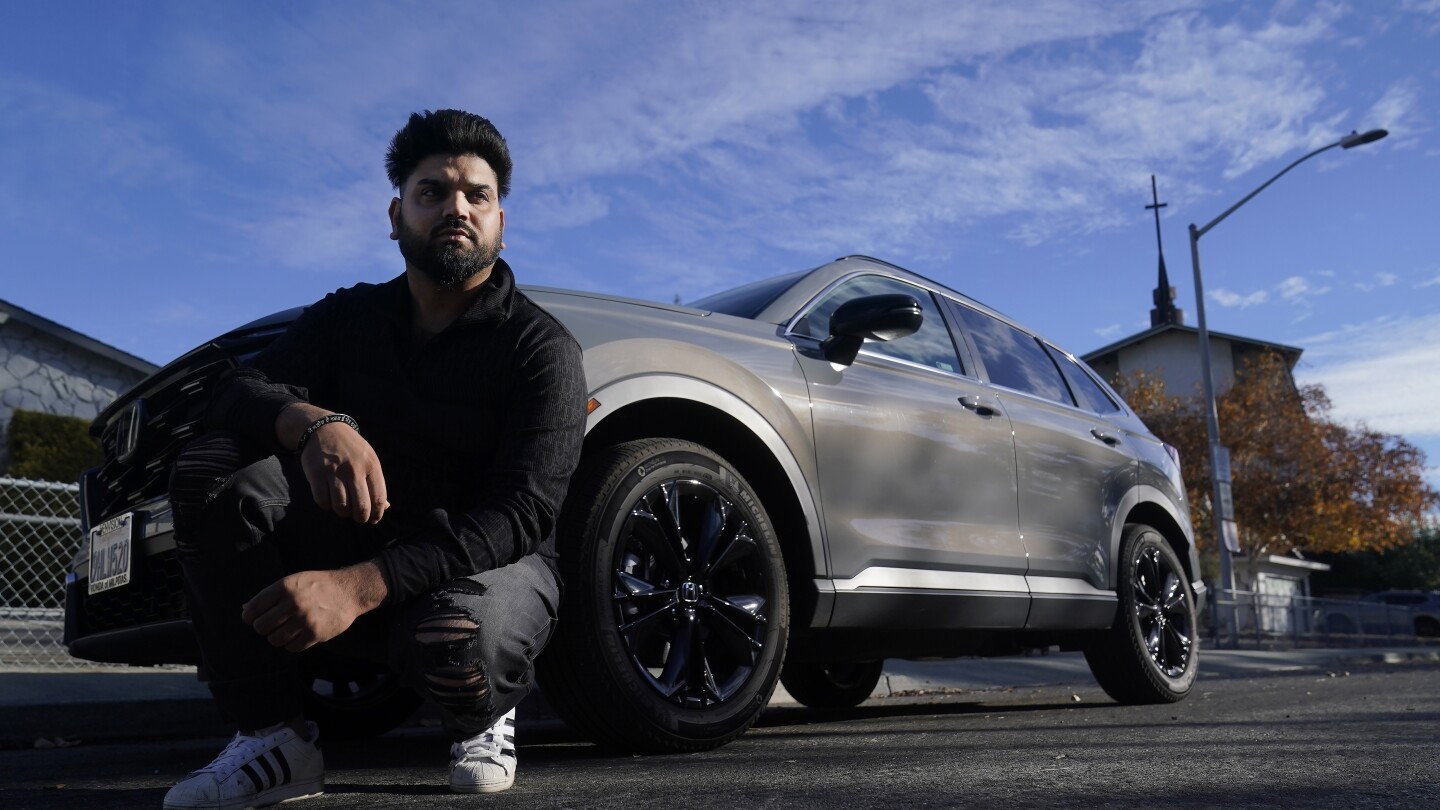America’s automakers have staked their futures on the notion that electric vehicles will dominate sales in the coming years, spurred by buyers determined to reduce carbon emissions and save on fuel.
But so far, while EV sales are growing, their pace is falling well short of the industry’s ambitious timetable for transitioning away from combustion engines. Instead, buyers are increasingly embracing a quarter-century-old technology whose popularity has been surging: The gas-electric hybrid, which alternates from gas to battery power to maximize efficiency.
So far in 2023, Americans have bought a record 1 million-plus hybrids — up 76% from the same period last year, according to Edmunds.com. As recently as last year, purchases had fallen below 2021’s total. This year’s figures don’t even include sales of 148,000 plug-in hybrids, which drive a short distance on battery power before a gas-electric system kicks in.
Sales have slowed because dealers are selling above MSRP still.
Sales have not slowed though. These articles are full of shit. “their year-over-year growth rate” has slowed, not sales. Sales numbers are still increasing. Just not increasing as wildly as they were in the past.
Charge time, charging infrastructure, and price are the things keeping me from getting an EV.
Regarding the first two, I find charging my EV at home means I rarely have to consider public charging. I’ve started to find stopping at the gas station way more inconvenient.
When I lived in the city, I maintained charge with a standard 120v outlet. In a rural area, I am doing well with a 240v (15a).
12 hour+ road trips are the only thing I hesitate on much anymore — sometimes I love the EV road trip, and other times I’m just looking to make good time.
It’s a problem for those that cannot charge at home. My apartment complex will not install chargers and I have no easy way to run a charger myself.
That’s not to say your point does not stand, but it’s still not a reality for folks like me quite yet. After my last car was totaled (RIP), I went with a hybrid. Pretty good fuel economy (35-45mpg in the city, 50-60 on the highway) and it hasn’t given me any issues so far.
If I still need a car by the time this one bites the dust, then I would definitely consider if an EV would fit my needs.
There will be laws if there aren’t already where you are that will require apartment buildings to install chargers if a tenant wants one, at the tenants cost.
There will then also be incentives for that, making it easier.
Its too obvious a problem to do nothing about with the transition goals in place.
Edit: also if they’re such dicks about an install you might even be able to install a portable charger that you can remove when you leave, or have it just be a plug. You don’t necessarily need to pay for a permemant fixture level 2 smart charger.
That would be big for EV infrastructure. I see where there is a push for such regulations now after looking it up after reading your reply, but that was not a thing when I needed it. Doesn’t really make a whole lot of sense to get an EV when I already have a car right now.
Before I bought my hybrid, I looked into the portable chargers and the parking spots are too far away from where I can access an outlet. But they would work for other folks, so it does open up the possibility for more people.
at the tenants cost.
Jeez, who wants to foot that bill so the next guy doesn’t?
That’s why I suggested just a plug vs a whole charger, but you also might own the place in a condo.
Having a plug installed also benefits the property owner if renting so they might be willing to split the cost.
And if you really want an EV it might be worth it.
Running a plug to an apartment building parking lot properly would not neccesarily be cheap. I doubt a renter would be better off paying for that vs just running an efficient gas car. It only makes sense if you do it for the whole building at once at least then you get some economies of scale with bringing an electrician out and running wire through a parking lot.
It’s possible there might already be power nearby somewhere and adding a 120v plug isn’t that complicated. If they can’t put it on it’s own meter, you might need to enter into some agreement with the owner where you show them your cars monthly charging and then pay them accordingly, or they might do a fixed rate.
There are options there.
It really comes down to the owner and how much of a dick they want to be.
For most use cases, you won’t even need a full charger, just a standard outlet to plug in the car’s standard slow charger.
We leased a PHEV, in part, because of this. The other half was finding an EV that comfortably fit 5 people for road trips (live in the western US).
Which one did you get? I would love a plug in hybrid, but I need the third row for the dog, and all of them get middling reviews.
Not the guy you were talking to but a family member recently got the Kia Sportage PHEV, they are very happy with it.
No third row, but it’s a very roomy SUV
A roomy trunk would work for the dog. Thanks!
Side question, are people still stealing Kias as a social media challenge?
I wouldn’t know 🤔
I’ll have to tell my sister to keep an eye out though
Not the OP, but the Kia thefts were on their lower trim packages that did not have push to start options and used keyed ignition instead. Any of their PHEVs or hybrid models tend to only have the higher trim packages so they can charge more for them (I own a Kia Niro PHEV), and the push to start keyless starters have the immobilizer installed. It’s started to die down a bit on the thefts, but make sure that the model you’re looking at has push to start AND immobilizer installed before buying.
I love my Kia, and I would recommend them highly based on my personal experience, but just make sure you research before picking one up.
Thank you, that’s very helpful!
Mazda CX-90. Very comfortable 3rd row. Ours is the 7-seater with captains chairs in the middle row. It’s also a blast to drive.
Thanks! My wife had a Mazda 3 back in the day, and I always enjoyed driving it. I didn’t even know Mazda was making a PHEV.
This is Mazda’s new PHEV platform and flagship car. It’s a 2.5L Turbo and has a 26 mile battery (gets more than 30 in summer, 15 in winter). Pure EV mode, Off Road, Normal, Sport (which is more than adequate for overtaking), and Towing if you get the package.
90% of the time we’re in EV only, but when we need range the gas will get us over 400 miles consistently. It comes with a level 1 charger but supports level 2 up to 32A for faster charging. It does not support level 3. Only real issue is the battery is smaller than we’d like but we’re also in the west where everything is spread out. Even then, as I said, we’re still in EV only most of the time. It does have aggressive regen braking with a setting to lighten it (never tried it) so it recovers charge pretty quickly. It can recharge the EV battery while driving but gas mileage will drop by a few miles/gal and it takes a full hour from dead. It does have a healthy reserve so when it’s stopped it’s almost always in EV with the engine stopped. It also has Auto Hold so you don’t have to leave your foot on the brake at lights. This works in gas mode as well. However, it defaults to off so you have to press the button each startup.
Suspension is stiffer than some like but it’s no worse than modern Kia’s. This is with the 21” wheels, 19’s would be softer. Steering wheel is typical Mazda stiff so it tracks straight absolutely sublimely.
Ours has the upgraded Bose audio system and, as an audio snob, it’s actually very good. Has 3 subs (1 large in the trunk, 2 smaller in the front footwells). It can sound boomy or pretty clear depending on EQ you prefer. It’s 90% as good as a system I built in my previous vehicle. It’s even better at low volume and higher speeds thanks to the adequate auto volume/EQ leveling. I wouldn’t bother upgrading the speakers.
It definitely still has the zoom, zoom.
Thank you! That’s very helpful
Those and battery range as well for me are still issues. I’m sure in 5 years at least some of these problems will be solved. Though I doubt the price of EVs would come down to a reasonable point any time soon.
A lot of manufacturers are working towards a cheaper EV, they just don’t know how to make a good profitable cheap EV yet. That’s why they’re doing the bigger more expensive ones first, so they can figure out how to do it cheaply, and also gives themselves time for all the infrastructure they’re building like battery factories to come online which will also reduce cost.
There’s a few cheaper ones out there like the Bolt, but GM lost money on that. It was just to get the brand out there and learn how to make EVs and get some ZEV credits. It’s why they never went large scale with it.
But it’s coming. In 5 years there will be plenty of cheaper EVs, and more of the consumer infrastructure will be improved too.
If you own a single family home with off street parking …… adding a circuit for a charger cost slightly less than adding a circuit for an electric range, and the charger itself was only a few hundred.
I’m still too new to EVs so really haven’t had to charge much yet but 48a level 2 charger goes pretty fast.
Most of the time, treat it like charging your phone. Plug it in at night or when you get home and it will always be fully charged in the morning (or I have mine set to 80% to help the battery last longer). You could make this happen with a much slower charger and some people even get away with standard outlet
Road trips are a different story but I haven’t taken one yet. However I keep reading Tesla’s can charge a battery from 5% to 80% in half an hour and Hyundais are faster. That doesn’t seem bad at all
I definitely had charge anxiety, but my ioniq 6 comes with a simple wall charger that does the job nightly. It’s like plugging in your phone.
I don’t like the idea of the battery going out and now you’ve basically got the choice of nearly the cost of another car or getting another car.
Same thing happens when the power train of an ice goes out, ins about the same time as the expected battery death as well. The greater majority of ice vehicles don’t last decades either
What drive train costs $18k before labor?
Also I can rebuild an engine or transmission to save even more money.
I can’t rebuild a battery in my garage.I’m not opposed to EVs, but no one seems to be concerned about the maintenance once these things get old.
Battery banks are closed to 10k for most, engine and removed easily run 7k for parts and you have to factor in costs of oil and gas for them over that decade lifespan.
So few people are capable of at-home engine or removed rebuilds that it isn’t even a realistic consideration statistically
The problem is a drive train failure is a total failure. It either works at a 100% or not at all. A battery deteriorates non-linearly over time. So while you might have to replace both at the same time, the battery has had less effective use.
But a car that now only does 20 miles vs 200 before needing charge is still plenty usable for groceries or many work commutes while you save/wait for replacement, an ice power train failure means absolute dead lump of metal.
A car won’t be driving if it only has 20 miles. That’d be a battery failure that prevents the car from operating.
200 becomes 190, 180, 170 … 140.
At least on a Tesla below 140 would be covered under the 8 year warranty as that’s more degradation than should happen (unless you’re over mileage)
It’ll keep going down from there, but there’s a point where the battery just won’t function properly with the car anymore due to voltages or something to do with the level of battery degradation.
So hypothetically when it’s hit 100, it won’t be able to accelerate properly anymore making it no longer viable as a car battery.
At that point you could maybe go into a secondary life as stationary storage which has less demands, or recycle it.
EV’s are simply too expensive for the middle class. Sales will take off when the price comes down.
Cars should be expensive. It’s insane that trucks are the number one selling vehicle. That shit should cost $100, 000.
This right here. Why buy an EV when I can get an Acura for like $24k? Once they become comparable in price to the cheapest ICE cars then sales will boom.
Too bad most of them aren’t plug-in hybrids. Including mine. If I could have plugged in my Prius every morning, I would have used almost no gas, because my former job’s commute was 10 minutes.
PHEVs are really what manufacturers need to build until the charging infrastructure is there. We went from filling gas 2x/month to 1/quarter. We’re in EV mode 90% of the time.
Also, with EVs they really need to throw in level 2 charger installation in (yeah, I know not everyone owns their housing situation). That would help A LOT.
I’ve been saying this for 25 years. PHEV is the bridge that carries the infrastructure forward.
I remember when we all ignored you 25 years ago. What a travesty, how right you were. We should have listened to you back then, when you were telling us that PHEVs were the bridge. You didn’t sound crazy at all on those AOL chat rooms.
Spot on, except it was ICQ and bbs’s.
I recognize that came off as douchey, like I’m smarter because I said it first, but I only meant that I strongly agree and have done for a very long time.
Yeah, the government speeding up charger infrastructure would help a ton. Thankfully they are at least helping a little bit, the faster the better for the reasons you stated.
I’ve had a hybrid, 2013 Fusion, which would get ~40MPG. Now I have a PHEV 2015 Fusion, and with our driving habits, it does ~53MPG overall.
However.
We bought the 2015 with about 36K miles on it, and at that time, the plug-in battery range was about 20 miles. Today, at almost 90K miles, that range is down to 10 or 11. Replacing the battery module (which includes both the PHEV and hybrid batteries, they’re separate components in the electrical system, but come together in one module) is about $10K just for the part. The car is worth less than that today.
My hesitation to buy a fully electric vehicle is because I don’t want to find myself with a car that has half its original range at only 100K miles (say, six or seven years), and would cost more than a used car to repair, or have little resale value. A decent and reasonably maintained ICE car should easily go 160K miles (perhaps a lot more) without having to have a repair on that scale done.
New EVs have a buffer built into the battery so that as it degrades, the extra capacity unlocks and range will stay the same for the length of the warranty period (5-8 years or so). 50% observed capacity loss wouldn’t happen until north of 300k miles I think
I’m sure that because my experience is limited, there’s things I need to learn - but I definitely understand people’s hesitation to jump to an EV in the absence of that knowledge.
I’m hesitant for winter use… If it’s parked outside for several days in the cold without plugging it in, will I be stranded when I return to the vehicle? My understanding is that they often have a heater to keep the batteries warm, but that eats up your range over time. I feel like the technology right now is great for cities and milder climates (which is most people, let’s be fair).
Can I drive 100-200kms, park it, and then leave it for 3-4 days and then still have that 100kms range when I return, even in the winter (-5°C to -15°C being an average day)? I understand my usage is not typical and most of the time an EV would do the trick just fine, I just can’t afford two vehicles…
You’d need an EV with a pretty large battery to drive a total of 200-300kms without charging over a few days in that cold. It would be an expensive model to achieve that.
If that was truly your driving situation, as an avid EV proponent, I’d suggest you not get one. At best, you’d barely manage it. At worst it would end up costing a fortune for tows, additional electric set up (adding a plug at your destination), or tons of hours waiting to charge. It would be an overall shitty experience.
Yeah, I’m really hoping the technology improves in the next decade to the point where EVs are viable for that sort of thing.
I’m in Canada and we’re looking to have all new vehicles sold be zero emission by 2035. Plug-in hybrids with at least an 80km range will count as zero emission though, and that does seem like a perfectly fair compromise that would work for me.
Those aren’t fair comparisons. A tiny battery in a compliance car that has such tiny range where you 0-100% the battery all the time is of course going to degrade much faster.
That car is nearly ten years old though, that’s the maximum expected lifespan of most vehicles before too many parts are failing to make it worth it. That’s no different for ice compared to EV, 10 years/200k miles is about the end of the road for almost all vehicles, the ones that live past that are rare and normally do it due to disuse but plenty of care
US average age of cars is 12.5. Plenty of cars are driven well past 10 years.
The most important thing for EV is to get a solid footing in the used car market. As much as manufacuters try to sell you on the idea that a car is a lifestyle choice, for most people it’s just tool. Primaraly to get to and from your workplace. It has to be cheap and reliable. The biggest workforce in any developed nation is the upper low - lower middle class. Most of them can only afford used cars. The first manufacturer to implement measures to make 4-8 year old EVs a viable alternative to combustion engine vehicles will most likely be king for least 2 years till everybody else catches up.
Or to sell a new one cheap enough. In China you can buy a decent brand new EV for ~$15k. Just like a base (no carpet, airbags, power windows, or anti-lock brakes) Toyota Helix pickup is sold outside the US for ~$10k.
Helix episode of top gear was the peak of that show
It MIGHT have something to do with the fact that manufacturers are pricing their electrics like high end cars and not releasing the mid tier car that middle America wants and can afford.
Well yeah, hybrid technology works well on most models. Better mileage and sometimes better power with few downsides.
The downside is complexity. EV’s are simple with a lot less parts. Hybrids have the parts of a gas car plus the parts of an EV.
Yeah I’ve alwayd been told buy an all electric or all gas car and stay away from hybrids but a buddy of mine had a used hybrid and loved it until he gave it to his mom when she needed a car
Do you mean better range? You cant get better mileage than 0 gallons to the mile.
I meant better mileage than internal combustion, yeah sometimes as low as zero if the hybrid allows electric-only.
I was looking at used Leafs and they might have been able to get me to work if it wasn’t too cold.
EVs need to unify their charging solutions and governments need to expand the charging infrastructure while actually keeping it maintained.
I bought a PHEV. It feels like the sweet spot. I can charge and do 90% of my driving on electricity, if I want to, since most of my driving is shorter range commuting. But, I can also take it on long road trips without fighting for charging infrastructure or having long downtime between charges. It gets great gas mileage even without plugging in. Actually, the gas mileage is so good that it’s more expensive to drive on electric most of the time.
I looked at PHEVs before landing on just getting an EV. I don’t understand why they have such small batteries. The ones I looked at said they could do like 15-18 miles on electric. I feel like if that was 30-36 then it’d be usable, but half that didn’t do much for me.
PHEVs are the worst of both worlds. Tiny battery, extra maintenance for both, extra weight of both. Only get slow charging. There have also been studies done that show most people don’t charge them and so you end up with an even higher amount of pollution than a 100% ICE because the smaller engine - despite having a better mpg.
I’d like to find a PHEV. It would be perfect for most of our daily driving - 12 miles to work. And we live ~500 miles from family, so we still need to be able to take the kids to see the grandparents for holidays. Subaru had a PHEV Crosstrek for a couple of years, but stopped making it available after 2019, iirc.
I’m hoping there are more PHEV models available when we’re ready to buy a new car in a few years.
You just described the perfect use case for an EV. Having to stop to charge once for like 15 minutes for a trip you make during the holidays shouldn’t be used as an excuse to haul around an entire gasoline engine.
We’ve driven that route for 5 years now, and I don’t know that I’ve ever seen a charging station. I’m sure there is one, somewhere, but that’s not something I want to try and yolo my way through.
I’m a big fan of the Ioniq5, and if Hyundai weren’t having so many issues with their business lately, that’d be my first choice. We’re keeping our current vehicle when it’s time for a new one, so we can use that for trips. What I need more than anything is something dependable and reasonable (features and price) for my wife to take to work every day.
Personally, I think a PHEV is a better option for that because she can use gas if absolutely necessary, and if everything goes as planned, she can use the electric for all of her daily driving. The reliability of predicability is what I’m hauling a gasoline engine around for. If I’m spending $40-50k on a vehicle, I want to know that it’s going to last for 8-10 years, that the company isn’t going to randomly brick a feature because they feel like it today, and that the company I’m giving money to has engineered the best product they can.
If you don’t own a house with a garage it’s but practical to own a full EV. Throw in range anxiety and fears of defending battery life over time and it makes sense that people want hybrid and plug-in hybrid vehicles.
On a recent vacation my family rented a Tesla, and the place we were had limited infrastructure to support it.
I had several takeaways:
-
The drivetrain of an electric vehicle is fantastic, eventually it’s the future all cars will have
-
The charging infra and paradigm we have right now would be limiting in some use cases
-
A plug-in hybrid gets you most of the upsides of an electric drivetrain and the ability to run all-electric for in-town errand running, but also has the ability to refuel at the rate of chugging gasoline into a tank
-
We don’t want a Tesla, their QC is sub-par and it’s only a matter of time before real car companies ramp up on the EV and bring their QC chops to the game
One day, when batteries are a common standard and can be swapped like you swap a propane cylinder for your grill, I will have no reason to want a PHEV, we’ll be able to ditch the dead-weight gas engine foreverrr
-
With Toyota touting 700+ miles on an upcoming solid-state battery architecture, it’s hard to justify a 250 mile EV that runs $50k (Toyota bz4), plus good luck finding one. Or you can roll the dice on reliability and go for a Volkswagen with a 275 mile range for $45k. It just seems like waiting is the smart consumer move, and getting a PHEV is the best option right now.
My electricity goes out several times a year for 3-5 days at a time due to “storm damage” (A stiff breeze will knock out half the state). No thanks, I don’t want anything that relies on the electrical grid, be it cars, heating, or appliances.
Ill stick with diesel, gas, oil, coal, and wood.
What kind of car runs on wood?
I only skimmed this article, but I knew about gasification.
Seems easier to just move
The gas-electric hybrid, which alternates from gas to battery power to maximize efficiency.
Misnomer.
Hybrids are way worse for efficiency because you are going to end up running either on gas or electricity while having to carry the weight of the other. But fun to see that Americans are hopping on falling EU trends for once after those shit stains had been criticized rightfully so for a long time now.Edit: American exceptionalism downvotes. 🤡
Gas electric hybrids come in two variations, standard and plugin.
The plugin is far more efficient, because the electricity at your outlet is produced with far fewer emissions on average than at your alternator. Your first 20-50 or so miles are costing the equivalent of like 12 cents a gallon, and that accounts for like 90% of all personal driving. Even with the added weight of both systems, it’s more efficient and less expensive to drive for almost everyone. The only people who would not benefit are daily commuters driving significantly farther than the battery will take you.
The non-plugin hybrid will charge the batteries with excess (normally wasted) energy from the engine and the brakes. That energy can be used for short distances, and whether it is more or less efficient overall depends on where you live and how you drive. Stop and go city traffic is better in the hybrid than open road highway driving.
No. Because the reality is that no one is going to charge their hybrid electrically and just uses the combustion engine instead. And as I said already, the EV parts have to carry the combustion engine parts of the car and the combustion engine parts have to carry the EV engine parts of the car, making both variants less efficient than their pure counterparts. Like I said, we’ve been through this exact scenario already for many years over here. If you have the choice between a hybrid and a pure EV, go for the pure EV. Or better, see if you can drop your cage entirely if possible.
While I don’t doubt there are people too lazy to plug in, especially when they only have a level 1 chargwr at home, just having the option will encourage more charging infrastructure. New homes are being built with a 240v circuit to the garage “just in case” the buyer gets an electric car. Corporations are installing chargers in oreferred parking spaces and calling it an employee benefit.
You’re saying people are wasteful. That’s true. People could drive slower on the highway and save money because they use less gas.
Going pure EV is better, but people still want to be able to fuel up in 5 minutes. Giving them both in one car will support the transition as adoption expands.














